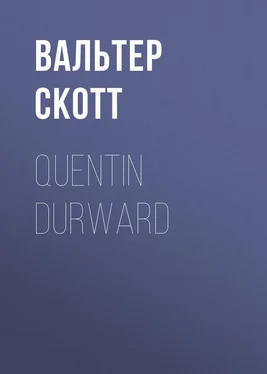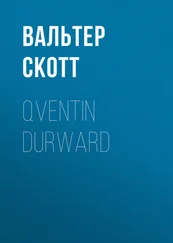Вальтер Скотт - Quentin Durward
Здесь есть возможность читать онлайн «Вальтер Скотт - Quentin Durward» — ознакомительный отрывок электронной книги совершенно бесплатно, а после прочтения отрывка купить полную версию. В некоторых случаях можно слушать аудио, скачать через торрент в формате fb2 и присутствует краткое содержание. Жанр: foreign_antique, foreign_prose, Альтернативная история, на английском языке. Описание произведения, (предисловие) а так же отзывы посетителей доступны на портале библиотеки ЛибКат.
- Название:Quentin Durward
- Автор:
- Жанр:
- Год:неизвестен
- ISBN:нет данных
- Рейтинг книги:3 / 5. Голосов: 1
-
Избранное:Добавить в избранное
- Отзывы:
-
Ваша оценка:
- 60
- 1
- 2
- 3
- 4
- 5
Quentin Durward: краткое содержание, описание и аннотация
Предлагаем к чтению аннотацию, описание, краткое содержание или предисловие (зависит от того, что написал сам автор книги «Quentin Durward»). Если вы не нашли необходимую информацию о книге — напишите в комментариях, мы постараемся отыскать её.
Quentin Durward — читать онлайн ознакомительный отрывок
Ниже представлен текст книги, разбитый по страницам. Система сохранения места последней прочитанной страницы, позволяет с удобством читать онлайн бесплатно книгу «Quentin Durward», без необходимости каждый раз заново искать на чём Вы остановились. Поставьте закладку, и сможете в любой момент перейти на страницу, на которой закончили чтение.
Интервал:
Закладка:
In fact, the old Lord, who at first smiled, shook his head, and placed the untasted winecup before him, began presently, as if it were in absence of mind, to sip a little of the contents, and in doing so, fortunately recollected that it would be ill luck did he not drink a draught to the health of the gallant lad who had joined them this day. The pledge was filled, and answered, as may well be supposed, with many a joyous shout, when the old leader proceeded to acquaint them that he had possessed Master Oliver with an account of what had passed that day.
“And as,” he said, “the scraper of chins hath no great love for the stretcher of throats, he has joined me in obtaining from the King an order, commanding the Provost to suspend all proceedings, under whatever pretence, against Quentin Durward; and to respect, on all occasions, the privileges of the Scottish guard.”
Another shout broke forth, the cups were again filled till the wine sparkled on the brim, and there was an acclaim to the health of the noble Lord Crawford, the brave conservator of the privileges and rights of his countrymen. The good old Lord could not but in courtesy do reason to this pledge also, and gliding into the ready chair; as it were, without reflecting what he was doing, he caused Quentin to come up beside him, and assailed him with many more questions concerning the state of Scotland, and the great families there, than he was well able to answer, while ever and anon, in the course of his queries, the good Lord kissed the wine cup by way of parenthesis, remarking that sociality became Scottish gentlemen, but that young men, like Quentin, ought to practise it cautiously, lest it might degenerate into excess; upon which occasion he uttered many excellent things, until his own tongue, although employed in the praises of temperance, began to articulate something thicker than usual. It was now that, while the military ardour of the company augmented with each flagon which they emptied, Cunningham called on them to drink the speedy hoisting of the Oriflamme, the royal banner of France.
“And a breeze of Burgundy to fan it!” echoed Lindesay.
“With all the soul that is left in this worn body do I accept the pledge, bairns,” echoed Lord Crawford; “and as old as I am, I trust I may see it flutter yet. Hark ye, my mates,” (for wine had made him something communicative), “ye are all true servants to the French crown, and wherefore should ye not know there is an envoy come from Duke Charles of Burgundy, with a message of an angry favour?”
“I saw the Count of Crevecoeur’s equipage, horses, and retinue,” said another of the guests, “down at the inn yonder at the Mulberry Grove. They say the King will not admit him into the Castle.”
“Now, Heaven send him an ungracious answer!” said Guthrie; “but what is it he complains of?”
“A world of grievances upon the frontier,” said Lord Crawford; “and latterly, that the King hath received under his protection a lady of his land, a young Countess, who hath fled from Dijon, because, being a ward of the Duke, he would have her marry his favourite, Campobasso.”
“And hath she actually come hither alone, my lord?” said Lindesay.
“Nay, not altogether alone, but with the old Countess, her kinswoman, who hath yielded to her cousin’s wishes in this matter.”
“And will the King,” said Cunningham, “he being the Duke’s feudal sovereign, interfere between the Duke and his ward, over whom Charles hath the same right, which, were he himself dead, the King would have over the heiress of Burgundy?”
“The King will be ruled as he is wont, by rules of policy, and you know,” continued Crawford, “that he hath not publicly received these ladies, nor placed them under the protection of his daughters, the Lady of Beaujeu, or the Princess Joan, so, doubtless, he will be guided by circumstances. He is our Master – but it is no treason to say, he will chase with the hounds, and run with the hare, with any prince in Christendom.”
“But the Duke of Burgundy understands no such doubling;” said Cunningham.
“No,” answered the old Lord; “and, therefore, it is likely to make work between them.”
“Well – Saint Andrew further the fray!” said Le Balafre. “I had it foretold me ten, ay, twenty years since, that I was to make the fortune of my house by marriage. Who knows what may happen, if once we come to fight for honour and ladies’ love, as they do in the old romaunts.”
“Thou name ladies’ love, with such a trench in thy visage!” said Guthrie.
“As well not love at all, as love a Bohemian woman of Heathenesse,” retorted Le Balafre.
“Hold there, comrades,” said Lord Crawford; “no tilting with sharp weapons, no jesting with keen scoffs – friends all. And for the lady, she is too wealthy to fall to a poor Scottish lord, or I would put in my own claim, fourscore years and all, or not very far from it. But here is her health, nevertheless, for they say she is a lamp of beauty.”
“I think I saw her,” said another soldier, “when I was upon guard this morning at the inner barrier; but she was more like a dark lantern than a lamp, for she and another were brought into the Chateau in close litters.”
“Shame! shame! Arnot!” said Lord Crawford; “a soldier on duty should say naught of what he sees. Besides,” he added after a pause, his own curiosity prevailing over the show of discipline which he had thought it necessary to exert, “why should these litters contain this very same Countess Isabelle de Croye?”
“Nay, my Lord,” replied Arnot, “I know nothing of it save this, that my coutelier was airing my horses in the road to the village, and fell in with Doguin the muleteer, who brought back the litters to the inn, for they belong to the fellow of the Mulberry Grove yonder – he of the Fleur de Lys, I mean – and so Doguin asked Saunders Steed to take a cup of wine, as they were acquainted, which he was no doubt willing enough to do.”
“No doubt – no doubt,” said the old Lord; “it is a thing I wish were corrected among you, gentlemen; but all your grooms, and couteliers, and jackmen as we should call them in Scotland, are but too ready to take a cup of wine with any one. – It is a thing perilous in war, and must be amended. But, Andrew Arnot, this is a long tale of yours, and we will cut it with a drink; as the Highlander says, Skeoch doch nan skial [‘Cut a tale with a drink;’ an expression used when a man preaches over his liquor, as bons vivants say in England. S.]; and that ‘s good Gaelic. – Here is to the Countess Isabelle of Croye, and a better husband to her than Campobasso, who is a base Italian cullion! – And now, Andrew Arnot, what said the muleteer to this yeoman of thine?”
“Why, he told him in secrecy, if it please your Lordship,” continued Arnot, “that these two ladies whom he had presently before convoyed up to the Castle in the close litters, were great ladies, who had been living in secret at his house for some days, and that the King had visited them more than once very privately, and had done them great honour; and that they had fled up to the Castle, as he believed, for fear of the Count de Crevecoeur, the Duke of Burgundy’s ambassador, whose approach was just announced by an advanced courier.”
“Ay, Andrew, come you there to me?” said Guthrie. “Then I will be sworn it was the Countess whose voice I heard singing to the lute, as I came even now through the inner court – the sound came from the bay windows of the Dauphin’s Tower; and such melody was there as no one ever heard before in the Castle of Plessis of the Park. By my faith, I thought it was the music of the Fairy Melusina’s making. There I stood – though I knew your board was covered, and that you were all impatient – there I stood like – ”
Читать дальшеИнтервал:
Закладка:
Похожие книги на «Quentin Durward»
Представляем Вашему вниманию похожие книги на «Quentin Durward» списком для выбора. Мы отобрали схожую по названию и смыслу литературу в надежде предоставить читателям больше вариантов отыскать новые, интересные, ещё непрочитанные произведения.
Обсуждение, отзывы о книге «Quentin Durward» и просто собственные мнения читателей. Оставьте ваши комментарии, напишите, что Вы думаете о произведении, его смысле или главных героях. Укажите что конкретно понравилось, а что нет, и почему Вы так считаете.












